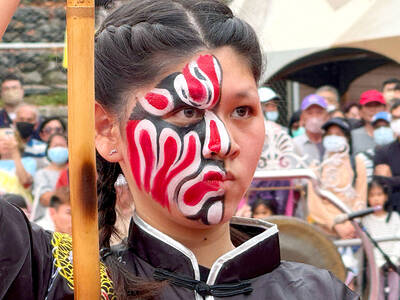A fter sharing directorial credits with Lawrence Lau (劉國昌) for last year’s City Without Baseball (無野之城), a movie about Hong Kong’s only amateur baseball team that featured a fair amount of full frontal nudity, Scud (雲翔) returns with Permanent Residence (永久居留). The semi-autobiographical movie traces the life of its protagonist from his birth in the 1960s to his death some 80 years later and deals with homosexual awakening, unrequited love and musings on life and death.
It is an honest and affected gay drama, but the film’s unbridled self-indulgence may be its undoing.
Ivan (Sean Li, 李家濠) is an IT professional who works hard and has no time for dating. The young man is forced to come face-to-face with his sexuality when Josh (Jackie Chow, 周德邦) from Israel asks if he is gay during a television talk show in which the two are guest speakers and a life-long friendship begins.
After entering the gay world, Ivan meets Windson (Osman Hung, 洪智傑), who professes to be straight. A curious friendship blossoms between the two involving many episodes of nude wrestling, swimming, embracing and sharing a bed. Though apparently attracted to the free-spirited Ivan, Windson insists on limiting their relationship to nothing more than kisses and fondling.
When Windson announces he plans to wed his long-time girlfriend, Ivan is devastated and sets off on a journey of discovery that takes him from Israel to Thailand to Australia and finally back to Hong Kong.
Permanent Residence is flamboyantly out. With the bodies of avid gym-goers, both leads take delight in celebrating their naked, muscular flesh for the audience’s viewing pleasure. They drop their towels and fly kick for no apparent reason, frolic on the beach, skinny-dip in the ocean, hold hands and share their secrets and longings in what feels like a homoerotic utopia.
The gay never-never land is effectively contrasted with the confining world of social norms that force Windson to stay with a woman who expects wedded bliss. The familiar torments of coming out will strike a chord with many Asian audience members.
Its honest, well-intended portrait of gay/straight relationships is the film’s only saving grace. Alternating between homoerotica and existential contemplations on life and death, the film is stylistically inconsistent, which shows that director Scud still has a lot to learn.
Permanent Residence tries to blend together too many subjects — love, relationships, identity and family — but none of them is fully explored. The movie flits from China to Japan, Israel to Thailand, to Australia, but instead of conveying philosophical undertones, the backdrops merely serve the purpose of vain embellishment and are superfluous.
The unexpected coda exudes a sci-fi, futuristic charm and provides entertainment value with its artlessness and stylistic oddity.
What is a real turn-off, however, is the unbridled narcissism acutely felt throughout the movie. Filmmakers often mine their personal experiences, but in this case the results are overbearing.
Ivan lives his childhood years in China and becomes an IT success in Hong Kong. Same with Scud. Ivan moves to Australia and returns to Hong Kong to make a baseball movie. Ditto Scud. Egocentric in the extreme, Permanent Residence contains many moments of self-promotion, including a scene in which Ivan’s brother urges him to reproduce because he’s just too talented not to pass on his genes.
Final verdict: the former IT whiz kid-turned-director may live an interesting life and have lots of stories to tell. But before Scud can make his own 8 1/2, he needs to master self-restraint.

April 7 to April 13 After spending over two years with the Republic of China (ROC) Army, A-Mei (阿美) boarded a ship in April 1947 bound for Taiwan. But instead of walking on board with his comrades, his roughly 5-tonne body was lifted using a cargo net. He wasn’t the only elephant; A-Lan (阿蘭) and A-Pei (阿沛) were also on board. The trio had been through hell since they’d been captured by the Japanese Army in Myanmar to transport supplies during World War II. The pachyderms were seized by the ROC New 1st Army’s 30th Division in January 1945, serving

The People’s Republic of China (PRC) last week offered us a glimpse of the violence it plans against Taiwan, with two days of blockade drills conducted around the nation and live-fire exercises not far away in the East China Sea. The PRC said it had practiced hitting “simulated targets of key ports and energy facilities.” Taiwan confirmed on Thursday that PRC Coast Guard ships were directed by the its Eastern Theater Command, meaning that they are assumed to be military assets in a confrontation. Because of this, the number of assets available to the PRC navy is far, far bigger

The 1990s were a turbulent time for the Chinese Nationalist Party’s (KMT) patronage factions. For a look at how they formed, check out the March 2 “Deep Dives.” In the boom years of the 1980s and 1990s the factions amassed fortunes from corruption, access to the levers of local government and prime access to property. They also moved into industries like construction and the gravel business, devastating river ecosystems while the governments they controlled looked the other way. By this period, the factions had largely carved out geographical feifdoms in the local jurisdictions the national KMT restrained them to. For example,

Shunxian Temple (順賢宮) is luxurious. Massive, exquisitely ornamented, in pristine condition and yet varnished by the passing of time. General manager Huang Wen-jeng (黃文正) points to a ceiling in a little anteroom: a splendid painting of a tiger stares at us from above. Wherever you walk, his eyes seem riveted on you. “When you pray or when you tribute money, he is still there, looking at you,” he says. But the tiger isn’t threatening — indeed, it’s there to protect locals. Not that they may need it because Neimen District (內門) in Kaohsiung has a martial tradition dating back centuries. On